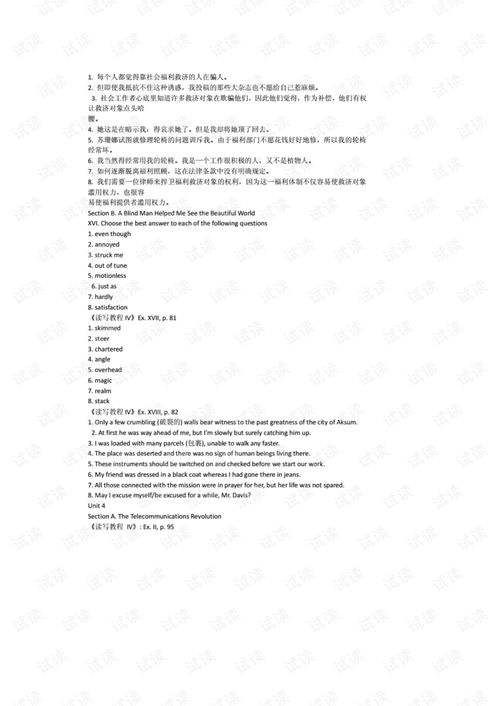新视野大学英语课文翻译第三版2
新视野大学英语(第六册)课文翻译

Unit 1 课文:Living Well, Spending Less
原文:
Living Well, Spending Less
It seems that everyone is interested in saving money these days. But it also seems that most people haven’t figured out that the easiest way to save money is to stop spending it.
I once had a conversation with a friend who wanted to learn how to save more money. She earned a good salary and didn’t have any major debts, yet she was always broke by the end of the month. I asked her how much she spent on lunch every day. She said she usually spent about $10 on lunch, sometimes more if she went to a fancy restaurant with colleagues. I did the math and told her that if she packed her lunch instead of eating out, she could save over $200 a month.
She was shocked. “But I don’t have time to make my lunch,” she said.
I didn’t want to sound unsympathetic, but I told her that if she valued saving money, she would make the time. I suggested that she could prepare her lunch the night before or wake up 15 minutes earlier to make a sandwich. She seemed unconvinced, but I noticed that she started bringing her lunch to work more often after our conversation.
The truth is, we all have choices about how we spend our money. If we want to save more, we have to spend less. That might mean giving up some conveniences, like buying coffee every morning or eating out for lunch every day. But if we make small changes to our spending habits, we can save a lot of money over time.
And saving money doesn’t mean that we have to stop enjoying life. In fact, some of the best things in life are free. Spending time with loved ones, taking a walk in nature, or watching the sunset don’t cost anything, but they can bring us a lot of happiness.
So if you want to live well and spend less, start by taking a close look at your spending habits. Identify areas where you can cut back and make small changes to your daily routine. You might be surprised by how much you can save—and how much more enjoyable life can be when you’re not worried about money all the time.
翻译:
过得好,花得少
看起来每个人都对省钱感兴趣。但也似乎大多数人还没想明白,省钱最简单的方法是停止花钱。
我曾和一个想学会如何存更多钱的朋友交谈过。她挣得不错,也没有什么债务,但每个月末总是身无分文。我问她每天午餐花费多少钱。她说她通常每天午餐花费大约10美元,有时如果和同事去高级餐厅,可能会花更多。我做了个简单的数学计算,告诉她,如果她自己带午餐而不是外出吃饭,她每个月可以省下200多美元。
她震惊了。“但我没时间做午餐,”她说。
我不想听起来毫无同情心,但我告诉她,如果她重视省钱,她会创造时间。我建议她可以前一晚准备好午餐,或者早起15分钟做个三明治。她似乎并不信服,但我注意到我们谈话后她开始更经常自带午餐上班了。
事实是,我们都可以选择如何花钱。如果我们想存更多钱,就必须花得少。这可能意味着放弃一些便利,比如每天早上买咖啡或每天外出午餐。但如果我们对消费习惯做些小改变,长此以往我们可以省下很多钱。
而且,省钱并不意味着我们要停止享受生活。事实上,生活中一些最好的事情是免费的。与亲人共度时光,漫步在大自然中,或者看日落都不花钱,但却能带给我们很多快乐。
所以,如果你想过得好,花得少,首先要仔细审视自己的消费习惯。找出可以削减开支的地方,对日常生活做些小调整。你可能会对自己能省下多少钱以及当你不再时时担心钱的问题时生活有多么愉快感到惊讶。
这个翻译如何?











